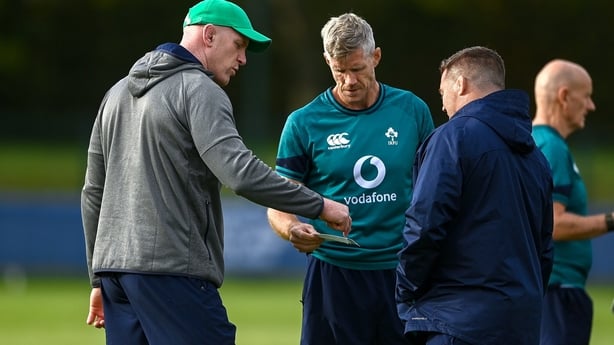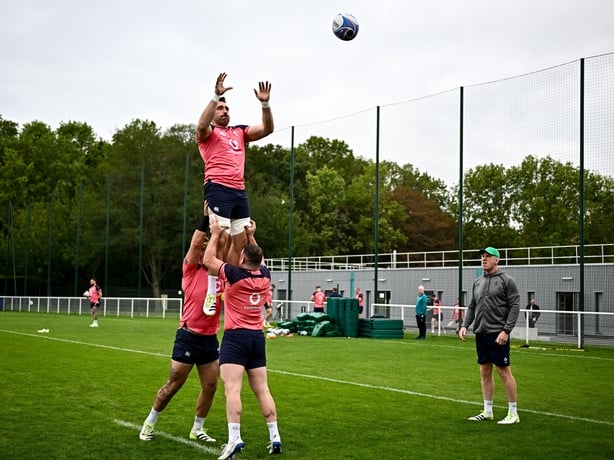Knockout rugby starts here, and Paul O'Connell hopes it lasts a while.
While Ireland effectively head into their Pool B decider with Scotland on Saturday with an eight-point head start, the meeting of the Six Nations rivals amounts to what those in the NBA world would call a 'Play-In' game for the quarters.
It's the first of what Ireland hope will be four games in consecutive weeks leading up to the final in Paris on 28 October.
Winning has become their habit in the last two years; their current run of 16 victories in a row is already an Irish record, and just two behind the all-time record for a Tier 1 nation. With every win, the pressure and scrutiny grows on the outside.
Dealing with that expectation has been an Achilles heel for Ireland down the years, with the emotional energy of one win not replicated the following week.
There's only so much emotion to go round week to week, so why not use less of it?
"I think being able to not rely massively on emotions is a big part of it," O'Connell says of his side's winning run.
"It's always a big strength of ours how much the lads love playing for Ireland, how important the history of the team is, you would have seen that during the Six Nations where we had a great week before we played France where we had a discussion about the anthems. The lads love playing for each other, they love playing for Ireland, they love pulling on the jersey and what it means and all that.
"But that's the icing on the cake now rather than the whole cake."

Head coach Andy Farrell has received huge credit for how welcoming he is of challenges to his players, whether it's stretching them to capacity on their five-game tour of New Zealand, or embracing the chaos of late injuries on gameday.
But O'Connell says Farrell's predecessor Joe Schmidt deserves credit for getting that ball rolling.
"In fairness, it would have come in under Joe and that ability to just be focused on what's right in front of you and now what's too far ahead of you, I think they have a big appetite around just getting better and improving, both individually and as a group.
"They don't have to build up how important the game is. We all know it and they all know it. They focus on getting better, they focus on the next moment, and that sometimes helps them block out some of the noise around the game.
"Probably the most important bit is that they don't get too far ahead of themselves. They are good at staying in the moment and being prsent and focusing on just what's in front of them. I know it sounds cliché but it is something we talk about and they talk about a lot.
"I think as well we know what we stand for as a team and how we want to play and how we want to do a lot of things in the game."
And by relying less on emotion, O'Connell believes it leads to greater clarity on the pitch.

"They're getting better and better and better at seeing those pictures, whether it's the maul or whether it's the ruck or whether it's the attack or the defence, we haven't had a lot of change.
"We've probably evolved more than changed and that helps with consistency. It's not cliché when they come in here and say it, they are just focused on getting better."
One of O'Connell's main areas of focus in the last 10 days since the win against South Africa will have been around the lineout, where his side gave up six of their 18 throws, four of which came in the opening 10 minutes.
While the stats don't make for attractive reading, the forwards coach says he takes a lot of comfort in how calm his players stayed in the storm of the Stade.
"Against South Africa, it was a tough start, they were good defensively, we were probably poor on our behalf on the drill, and they managed to sneak an extra man in for one of the lineouts close to their line which was disappointing, but fair play to them.
"They were really good at the start of the game. What I was really delighted with was how the lads worked through it, how Rónan Kelleher and the lineout leaders worked through it, figured it out and got us back on track.
"We haven’t trained any differently or done anything differently really, it’s been a real good learning for the lads and luckily for us those learnings have come in games that we’ve won. We’re against a real good lineout side this weekend again who can cause problems for teams and I’m sure they’ll cause us a few problems as well and it will just be down to how we react and how we handle them."
Listen to the RTÉ Rugby podcast on Apple Podcasts, Spotify or wherever you get your podcasts.
Listen to live commentary of Ireland v Scotland on Saturday on RTÉ Radio 1, or follow a live blog on RTÉ.ie and the RTÉ News app.








